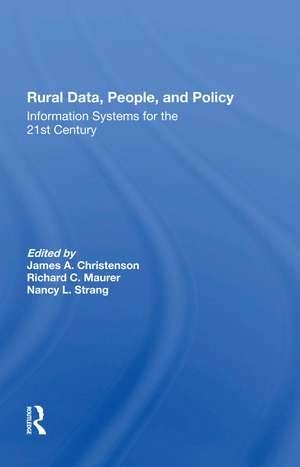Rural Data, People, And Policy: Information Systems For The 21st Century
Autor Lis M. Maurer, Nancy Strang, James A Christensonen Limba Engleză Paperback – 31 mai 2021
| Toate formatele și edițiile | Preț | Express |
|---|---|---|
| Paperback (1) | 381.96 lei 6-8 săpt. | |
| Taylor & Francis – 31 mai 2021 | 381.96 lei 6-8 săpt. | |
| Hardback (1) | 774.93 lei 6-8 săpt. | |
| Taylor & Francis – 13 sep 2019 | 774.93 lei 6-8 săpt. |
Preț: 381.96 lei
Nou
Puncte Express: 573
Preț estimativ în valută:
73.15€ • 75.37$ • 61.28£
73.15€ • 75.37$ • 61.28£
Carte tipărită la comandă
Livrare economică 22 februarie-08 martie
Preluare comenzi: 021 569.72.76
Specificații
ISBN-13: 9780367301729
ISBN-10: 0367301725
Pagini: 232
Dimensiuni: 152 x 229 x 15 mm
Greutate: 0.34 kg
Ediția:1
Editura: Taylor & Francis
Colecția Routledge
Locul publicării:Oxford, United Kingdom
ISBN-10: 0367301725
Pagini: 232
Dimensiuni: 152 x 229 x 15 mm
Greutate: 0.34 kg
Ediția:1
Editura: Taylor & Francis
Colecția Routledge
Locul publicării:Oxford, United Kingdom
Cuprins
Foreword -- The Politics of Data -- Rural Data Needs: The Comparative Advantage of University Research -- The Politics of Information -- Rural Data Needs in Rapidly Changing Times -- Data for Rural Information Systems -- Multiple-Level Data Sets -- Longitudinal Data Sets for Rural Poverty Research -- Rural Family Studies: Multiple Wave, Multiple Indicator Data -- Sampling Frames for Rural Household Surveys -- Qualitative Insights to Enhance National Information Systems -- Technologies for Rural Information Systems -- Surveys and Rural Data Needs -- New Social Science Research Technologies -- Geographic Information Systems and Rural Data -- Epilogue
Notă biografică
James A Christenson, Richard C. Maurer, Nacy L. Strang
Descriere
This volume paints a critical view of the state of rural data systems in America with a collection of contributions leading scholars in the social sciences arena. It places an important wake-up call social scientists engaged in rural research, alerting them to the problems of existing data systems.
